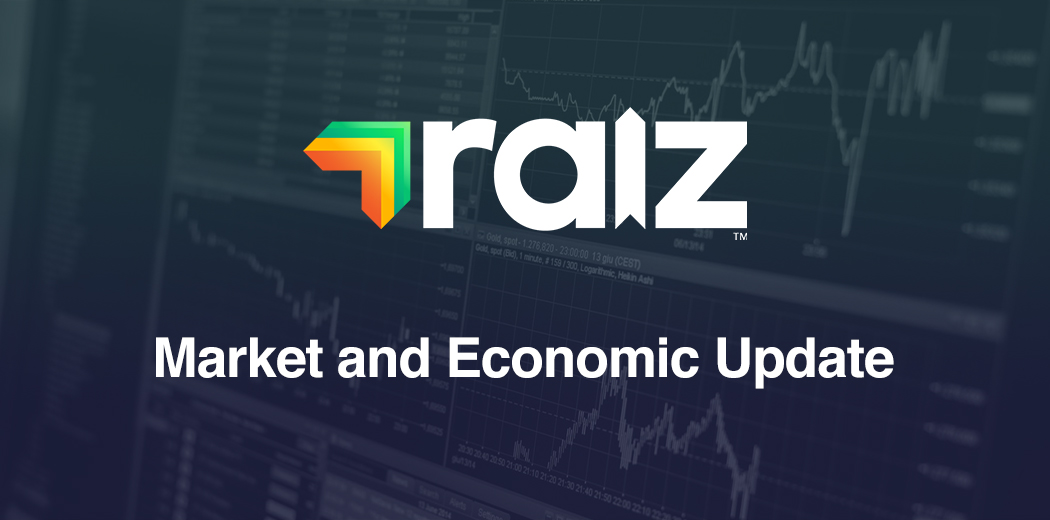Market and Economic Update: Trump orders new China tariffs

05-08-19
George Lucas, Raiz CEO
Pound sinks to 30-month low
This week, the pound continued its poor performance, sinking to a 30-month low below $US1.21/£, pressured by a stronger US dollar, concerns about a no-deal Brexit and the Bank of England cutting economic growth forecasts.
Sterling is now close to the weakest it has ever been in nominal trade-weighted terms, witnessing an 8 per cent slide against the dollar since March 13, from above $US1.32/£.
However, this slump masks the fact that sterling’s valuation still does not look particularly low on the usual fundamental measures, suggesting the currency could go even lower.
For instance, let’s look at the size of sterling’s deviation from “purchasing power parity” levels. In simple terms, this is a measure of how far a currency is from the level that would eliminate differences between the price levels of two trading partners.
On a purchasing power parity basis, sterling does appear undervalued against the dollar, but this has more to do with the greenback’s broad-based strength. In fact, on the same basis, the pound is fractionally stronger than its “fair value” relative to the euro.
Similarly, the valuation of a country’s currency ought to be reflected in the size of its current account surplus or deficit, and the UK scores particularly poorly on this front. If anything, the size of the UK’s current account deficit suggests that sterling is still overvalued.
Trump orders new China tariffs
In the US, President Donald Trump caused a stir in markets by tweeting that a 10 per cent tariff will be imposed on the remaining $US300 billion of Chinese imports on September 1.
In the wake of the tweet, US Treasury yields fell further — dropping by around 15 basis points to under 1.90 per cent — as global bond markets rallied on the renewal of the trade tensions and investors factored in more monetary easing by the US Federal Reserve.
Markets are now fully pricing in a 25 basis-point cut to the federal funds rate in September, and around 85 basis points of easing in total by the end of 2020. This reflects concerns about the impact of the tariffs on the US and willingness of the Federal Open Market Committee (FOMC) to loosen policy based on global developments including the trade war.
S&P 500 falters as trade tensions flare
The S&P 500 dropped by over 2 per cent following Trump’s tweet and — unlike when the trade war flared up last summer — it has not held up better than stock markets elsewhere. The drop in US equities this time was also more broad-based across sectors as the new tariffs are likely to have a greater impact on US households.
Finally, the reaction in the currency market to the trade flare-up has been broadly in line with expectations. The US dollar has held firm against most developed market currencies despite the drop in US interest rate expectations.
This has been due to a rise in safe haven demand, which has propped up the Japanese yen and Swiss franc too. We think that these three haven currencies will continue to do well as global growth falters this year.
Eurozone struggles to emerge from slowdown
Turning to Europe, the slowdown in eurozone Gross Domestic Product (GDP) growth from 0.4 per cent quarter-on-quarter in Q1 to 0.2 per cent in Q2 was in line with the consensus forecast. Italy’s GDP flat-lined in Q2, while we think that Germany’s economic growth fell from 0.4 per cent in Q1 to about 0.1 per cent.
Meanwhile, headline inflation in the eurozone fell from 1.3 per cent in June to 1.1 per cent in July, in large part due to a decline in the core rate. And while the euro-zone jobless rate edged down, we think slower wage and employment growth will keep a lid on inflation.
Australia’s inflation gets boost from oil prices
In Australia, headline inflation picked-up in Q2 on the back of higher petrol prices, but underlying inflation remained subdued.
Looking at southeast Asia, Indonesia’s Q2 GDP growth likely stayed at around 5 per cent as weak commodity prices and softer global trade continued to dent exports, according to a Reuters poll.
Don’t have the Raiz App?
Download it for free in the App store or the Webapp below:
Important Note: The information on this website is provided for the use of licensed financial advisers only. The information is general advice and does not take into account any person’s particular investment objectives, financial situation or investment needs. If you are an investor, you should consult your licensed adviser before acting on any information contained in this website.
Investors only: The information in this Document is confidential it must not be reproduced, distributed or disclosed to any other person unless it is part of their statement of advice. The information may be based on assumptions or market conditions and may change without notice. This may impact the accuracy of the information. In no circumstances is the information in this Document to be used by, or presented to, a person for the purposes of making a decision about a financial product or class of products.
General advice warning: The information contained in this Document is general information only. It has been prepared without taking account any potential investors’ financial situation, objectives or needs and the appropriateness of this information needs to be considered in that context. No responsibility or liability is accepted by Instreet or any third party who has contributed to this Document for any of the information contained herein or for any action taken by you or any of your officers, employees, agents or associates.




